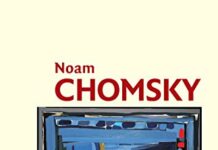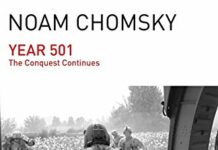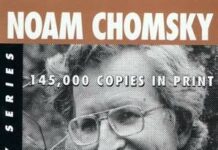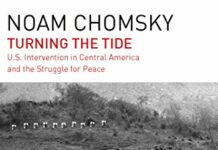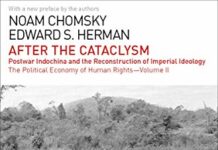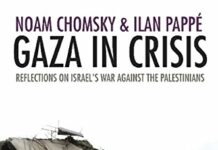
Ebook Info
- Published: 1998
- Number of pages: 304 pages
- Format: PDF
- File Size: 23.30 MB
- Authors: Noam Chomsky
Description
The years following 1945 witnessed a massive change in American intellectual thought and in the life of American universities. The effort to mobilize intellectual talent during the war established new links between the government and the academy. After the war, many of those who had worked with the military or the Office of Strategic Studies took jobs in the burgeoning postwar structure of university-based military research and intelligence agencies, bringing large infusions of government money into many fields.The essays in this text explore what happened to the university in these years and why. They show the many ways existing disciplines, such as anthropology, were affected by the Cold War ethos, and discuss the rise of new fields, such as area studies, and the changing nature of dissent and academic freedom during and since the Cold War.
User’s Reviews
Editorial Reviews: Review “A wonderful series of essays examining the effects of the Cold War on various university departments and the personal lives of the contributors.” ―Village Voice”Engrossing . . . The Cold War and the University adds new dimensions to the history of Cold War repression.” ―The Nation About the Author Noam Chomsky is the Institute Professor and a professor of linguistics, emeritus, at the Massachusetts Institute of Technology. A world-renowned linguist and political activist, he is the author of numerous books, including On Language: Chomsky’s Classic Works Language and Responsibility and Reflections on Language; Understanding Power: The Indispensable Chomsky, edited by Peter R. Mitchell and John Schoeffel; American Power and the New Mandarins; For Reasons of State; Problems of Knowledge and Freedom; Objectivity and Liberal Scholarship; Towards a New Cold War: U.S. Foreign Policy from Vietnam to Reagan; The Essential Chomsky, edited by Anthony Arnove; and On Anarchism, and a co-author (with Ira Katznelson, R.C. Lewontin, David Montgomery, Laura Nader, Richard Ohmann, Ray Siever, Immanuel Wallerstein, and Howard Zinn) of The Cold War and the University: Toward an Intellectual History of the Postwar Years and (with Michel Foucault) of The Chomsky-Foucault Debate, all published by The New Press. He lives in Lexington, Massachusetts.Ira Katznelson is a professor of political science at Columbia University. He has been a Guggenheim Fellow and is a fellow of the American Academy of Arts and Sciences and of the American Philosophical Society. He is a co-author (with Noam Chomsky, R.C. Lewontin, David Montgomery, Laura Nader, Richard Ohmann, Ray Siever, Immanuel Wallerstein, and Howard Zinn) of The Cold War and the University: Toward an Intellectual History of the Postwar Years (The New Press).R.C. Lewontin is an evolutionary biologist, a geneticist, and a social commentator. He is professor biology, emeritus, and Alexander Agassiz Professor of Zoology, emeritus, at Harvard University. He is a co-author (with Noam Chomsky, Ira Katznelson, David Montgomery, Laura Nader, Richard Ohmann, Ray Siever, Immanuel Wallerstein, and Howard Zinn) of The Cold War and the University: Toward an Intellectual History of the Postwar Years (The New Press).David Montgomery (1927 – 2011) was Farnum Professor Emeritus of History at Yale University. He was one of the founders of “New Labor History” in the United States. He is a co-author (with Noam Chomsky, Ira Katznelson, R.C. Lewontin, Laura Nader, Richard Ohmann, Ray Siever, Immanuel Wallerstein, and Howard Zinn) of The Cold War and the University: Toward an Intellectual History of the Postwar Years (The New Press).Laura Nader is a professor of anthropology at the University of California, Berkeley. She is a co-author (with Noam Chomsky, Ira Katznelson, R.C. Lewontin, David Montgomery, Richard Ohmann, Ray Siever, Immanuel Wallerstein, and Howard Zinn) of The Cold War and the University: Toward an Intellectual History of the Postwar Years (The New Press).Richard Ohmann is the Benjamin Waite Professor of English, Emeritus, at Wesleyan University. He is a co-author (with Noam Chomsky, Ira Katznelson, R.C. Lewontin, David Montgomery, Laura Nader, Ray Siever, Immanuel Wallerstein, and Howard Zinn) of The Cold War and the University: Toward an Intellectual History of the Postwar Years (The New Press).Immanuel Wallerstein is a senior research scholar in the department of sociology at Yale University and director emeritus of the Fernand Braudel Center at Binghamton University. He is also a resident researcher at the Maison des Sciences de l’Homme in Paris. His many books include The Modern World-System and Historical Capitalism. The New Press has published After Liberalism, The Decline of American Power, and a collection of his works, The Essential Wallerstein. He lives in New Haven, Connecticut, and Paris, France.Howard Zinn (1922–2010) was a historian, a playwright, and an activist. He wrote the classic A People’s History of the United States and is a co-author (with Noam Chomsky, Ira Katznelson, R.C. Lewontin, David Montgomery, Laura Nader, Richard Ohmann, Ray Siever, and Immanuel Wallerstein) of The Cold War and the University: Toward an Intellectual History of the Postwar Years (The New Press). He received the Lannan Foundation Literary Award for Nonfiction and the Eugene V. Debs Award for his writing and political activism.
Reviews from Amazon users which were colected at the time this book was published on the website:
⭐The most important events in the US during the Cold War were McCarthyism and the Vietnam War. But there were also other important issues, like research and field work funding or ideology.As L. Nader rightly remarks, `repressive and fear generating events such as the cold war periodically appear, thereby facilitating industrial and military regulation of academic affairs.’For N. Chomsky, the all important issue is `to reduce the threat of democracy and to establish more firmly the Madisonian principle on which the US was founded: that the prime responsibility of government is to protect the minority of the opulent against the majority.’McCarthyismFor, R. Lewontin, there was direct influence on academic affairs, because of `opportunism and cowardice of boards of trustees and university administrators.’There was passive acceptance of firings, blacklistings, attacks on unions and harassment. (H. Zinn)Ex-communists named names. Hundreds of teachers lost their job; many left the country; some committed suicide. (L. Nader)Research and field workResearch became more and more `militarized’: geophysics and oceanography (R. Siever), the social sciences (I. Wallerstein) or anthropology (L. Nader).In the face of US anti-State ideology, the codeword for grants was `war’: war on cancer, on diseases, on poverty or on drugs (R. Lewontin).Fieldwork by anthropologists was used in counterinsurgency, for expulsion of people out of areas with oil reserves, for testing of atomic technology on small human populations, for monitoring political loyalty and for creating a climate of intellectual repression. (L. Nader).IdeologyA general silence about the Cold War reigned among historians. But some went beyond silence by distorting the truth out of national loyalty. (H. Zinn)In `English Literature’, academics turned to timeless universals (love, death, art) and didn’t cover such notions as `history, race, class conflict, empire, power or privilege.’ (R. Ohmann)This mixed collection of essays is a most valuable contribution to the history of the Cold War. It is a must read for all those interested in US history.
⭐Viewing a political era from a particular point of view, from a subjective perspective can often manage to shed light on much more. The experiences reported by the individuals in this book are extremely well written stories that transcend the bounds of what at first seems a narrow topic. Still, if you have a particular interest in education and the politics of universities and colleges, you will find this book even more intriguing.
⭐Just a note on the review by the reader from New York posted on May 5, 1999: Laura Nader’s mention of Eric Wolf’s stealing documents was in fact a misprint inserted by an editor. It’s a long story, but I’m fairly certain of its validity. I’ve taken classes with her at UC Berkeley and in a discussion of the book she went out of her way to point out the error. Understandibly, she was quite upset.
⭐
Keywords
Free Download The Cold War & the University: Toward an Intellectual History of the Postwar Years in PDF format
The Cold War & the University: Toward an Intellectual History of the Postwar Years PDF Free Download
Download The Cold War & the University: Toward an Intellectual History of the Postwar Years 1998 PDF Free
The Cold War & the University: Toward an Intellectual History of the Postwar Years 1998 PDF Free Download
Download The Cold War & the University: Toward an Intellectual History of the Postwar Years PDF
Free Download Ebook The Cold War & the University: Toward an Intellectual History of the Postwar Years
